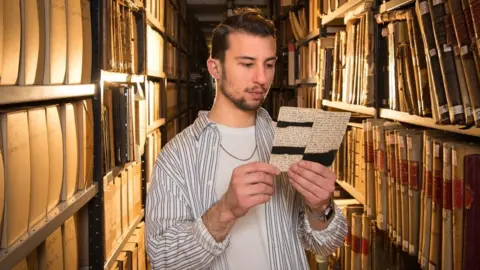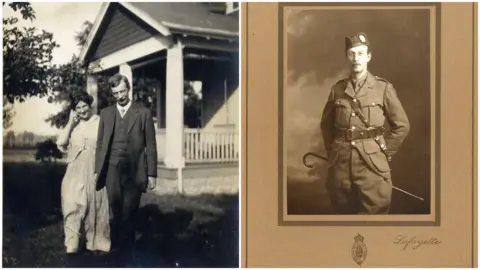Prisoner's love letters published online after 100 years
 Glasgow University
Glasgow UniversityThe letters of a World War One prisoner to his family are to be released by Glasgow University a century after they were written.
Seven months of correspondence between Prof Archibald Allan Bowman and his wife Mabel have been curated by student Petros Aronis.
The first letter was published on a social media account on Thursday.
The others will be gradually released to show how it must have felt to wait for news of a loved one.
Written between April 1918 and November 1918, they will be published 100 years later in the order they were written.
'Beautiful and touching'
Mr Aronis, from Athens, has curated the Bowman project on Instagram called Letters from A Prisoner of War 1918.
He said: "There are beautiful and touching sentiments expressed in the letters.
"It also shows the vital role, those on the home front had in providing prisoners of war with food and provisions parcels to keep them feed and clothed in the camps.
"In this project, as well as putting them into chronological order, I also have tried to highlight how the letters were impacted by the war."
 Glasgow University
Glasgow UniversityDuring the war, with censorship in place, the couple would not have received the letters in order and in some cases there would have been a lag of a few weeks.
For some of the letters the censors used black ink on top of the writing and in Mabel's case the censor cut out parts of her letters.
Written in both English and German, they paint a picture of life for the officers in captivity - although many sections of the correspondence are blacked out by censors.
'Remarkable insight'
Professor of conflict history and archaeology, Tony Pollard, said: "As a conflict historian, this is a remarkable insight into wartime Britain.
"They transport us back in time to see what ordinary people had to deal with both at home and on the front line during the First World War.
"This student research project also helps to bring a new understanding to the documents, showcasing the letters as historical objects which tell their own special story of war censorship.
"I am delighted to see these letters being published on social media to give a modern-day context to this superb archive."
